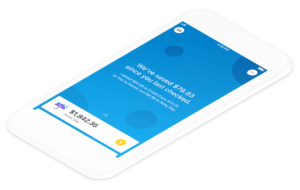Digit to focus on automation as it evolves its future plans
Digit, a personal finance app that helps users save automatically, raised $27.5 million in Series C funding on Monday.

The new financing will help Digit grow its user base; hire new talent in San Francisco; and grow its core product, a spokesperson for the company said. To date, Digit has raised over $63.8 million in funding. General Catalyst led the fundraising round, with participation from the Financial Venture Studio and Citi Ventures.
Founded in 2015, Digit was one of the first financial apps that let users to save money through an algorithm. In the two years since Digit launched its subscription service, it’s grown its customer base more than 300 percent, according to the company. As other startups and banks launch similar services, the pressure is on for Digit to stay relevant to its user base. For Digit, this means fine tuning its automation capabilities.
“We’re continuing to double down on automation and are constantly exploring new ways to make our customers’ financial lives easier,” a Digit spokesperson said. The company is looking at how its customers save, spend and borrow over the long term.
Digit is also attempting to set itself apart from other free app-based savings platforms through a commitment not to sell customer data to third-party companies. “We feel that a subscription model will allow us to be sustainable, without selling customer data or introducing products that could be damaging for consumers’ financial health,” the company spokesperson said.
Despite Digit’s growth, some analysts question the need for a service like Digit given banks’ moves to incorporate savings features into mobile banking apps. Bob Meara, senior analyst at Celent, recently cast doubt on Digit’s ability to survive as a standalone platform.
According to Meara, there are “apps for saving, apps for spend tracking [and] apps for peer-to-peer payments” alongside credit cards and online banking apps that compete with Digit. He argues the reason the “mono-function” app exists is because banks are squandering their opportunity to offer the similar services to Digit.
“It is no big feat for a fintech to offer this capability. It’s another thing entirely for a bank to do so – when most banks earn significant revenue from overdraft fees,” Maera wrote.
While Digit faces competitive pressure, the company’s founder Ethan Bloch recently told Bank Innovation Digit is focused on how to save clients save money and get on track with their finances. Within the past year, Digit has begun to focus on new use cases including overdraft fee avoidance and paying off credit card debt.
See also: Digit’s Bloch on the future of personal finance
“The reason people stay with Digit and pay for Digit is because it has a life-changing financial impact for them. The average Digit customer saves more than $2,000 per year,” Bloch said. “We’re able to have that level of impact because we can be maniacally focused on that single need of how do we help someone save more.”
Bloch emphasized that since Digit is a subscription-based service, the company doesn’t have to worry about making money through interchange fees or borrowing. Through an interchange fee-based traditional model, the company would make money whenever a customer spends money, which, according to Bloch, runs counter to Digit’s mission of assisting users with savings and paying off debt.
Tiffani Montez, senior analyst at Aite Group, said the market can support a company like Digit because of strong consumer interest in digital personal-finance platforms. In a consumer survey conducted by Aite Group at the end of 2017, more than 70 percent of respondents said they were interested in using a virtual finance wellness coach. According to Montez, four out of 10 consumers are willing to pay a fee to use a subscription-based personal finance service. The survey did not address whether consumers would prefer to receive these services from a bank or a third-party platform.
Montez noted that apps like Digit are building on a trend of holistic consumer financial wellness, which could open up opportunities for Digit to partner with other companies.
“Banks and credit unions aren’t the only ones trying to solve this problem; you’ve got fintech companies and employers who are offering employees financial wellness benefits,” she said. “There might perhaps be financial institutions that choose to work with partners that offer [automatic savings] capabilities. Everyone is trying to figure out how to take a little slice out of this opportunity.”
Bank Innovation Build, on Nov. 6-7 in Atlanta, helps attendees understand how to “do” innovation better. It is designed to offer best practices, to guide the innovation professional to better results. Register here.











